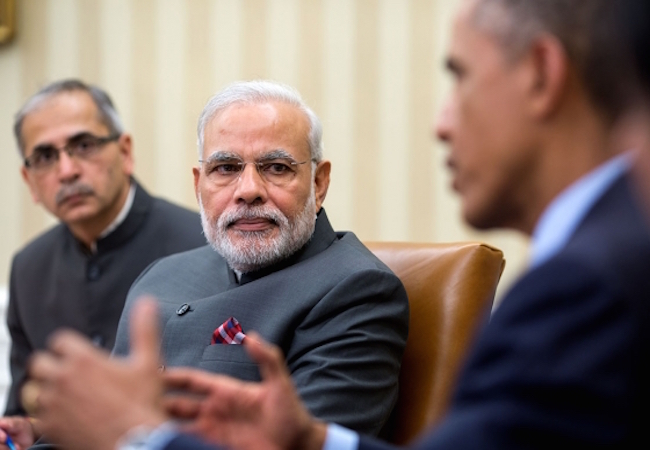
By Aqib Shoukat Paracha
This August will mark 70 years of Sub Continent’s Independence. The two South Asian nuclear states are still figuring out the real matters of contention. With the time passing by; the foreign policies of both states are taking new dynamics. These dynamics are resulting in multiplying and worsening of existing relations between Pakistan and India. The sizable shift in India’s foreign policy came with the PM Modi’s establishment. India and America today are more warmhearted and affectionate to each other than before. On other side is the China-Pakistan economic partnership, that could contribute to the stability paradox in South Asia. The China- Pakistan partnership doesn’t entail any major conventional buildup; neither has it promised to strategically compete with any state in neighborhood or around. That’s why it remains obvious that by no means Pakistan’s impression is questionable.
Strategic stability phenomenon in South Asia primarily bank upon the strategic plot between Pakistan and India. Contemporarily, both states are on lowest ground of their bilateral relations. The reason other than many destabilizing variables is India’s destructive kind of engagements with United States. The igniting factor for worsening of both states’ relations is the expanding defense cooperation between India and United States. Recently Ashton Cartor (the United States Secretary of Defense) and Manohar Parrikar (the Indian Defense Minister) reached an agreement that titled India as “Major Defense Partner” of United States. This accord will primarily boost their bilateral defense trade and will promote the co-production and co-development of defense-related equipment. India’s defense spending experiences a major upward shift every year; it will further expand after this agreement. The major defense partner status that along with other perks and privileges will constrain India to be more vigilant regarding the transformation in Indo-Pacific, which they both refer to as their mutual interest.
The Indo-United States partnership had seen unnatural advancement during Obama administration. In the same years Pakistan accomplished unusual successes in its war against terrorism. These successes paved the way for Pakistan’s to engage for promotion of reliable regional setting. Also, Pakistan engaged in an unusual economic cooperative agreement i.e. the CPEC. Pakistani authorities have made it clear many times that CPEC have no other gains other then forwarding Pakistan’s economic master plan. Pakistan has done sizable work for promotion of regional stability. But on the other hand, Indian conventional buildup and its tone of siding Pakistan have complicated the regional settling. In reciprocation to this Indian attitude Pakistan has to consider balancing of conventional capabilities to ensure deterrence stability. During United States and India’s growing diplomatic relations; Pakistan faced serious lack of trust in its relations with United States. This Indian partnership is also quoted by many defense analysts as a strategy to limit China’s regional and global expanding impression.
U.S- India strategic partnerships that aim to boost both India’s nuclear and conventional capabilities are seriously disconcerting for South Asian environment. The recent defense accord between India and United States pave the way for joint defense exercises raise question mark on regional stability. It proves the Pakistani stance that American partnership with India is a source of causing distress among regional states of South Asia. To counter this strategic imbalance Pakistan maintains a legitimate deterrent capability that is necessary for its survival. This day by day growing relation is narrowing the future probability of favorable relations between Pakistan and United States. Certainly, Pakistan will have to bridge this distance in order to balance the strategic output of Indo-U.S partnership. Further on, India’s acknowledgment of Cold Start Doctrine, leave no option for Pakistan other than improving its short range missile capabilities that it consider more valid to respond to India’s military adventurism. The reasons behind India’s emerging aggressive capabilities are its diplomatic and defense ties with United States. India portray itself a reliable partner to United States for counter China Policy. This American defense initiative has pulled South Asian region into a vulnerable environment; that directly force Pakistan for building counter measures either by arms buildup or by diplomatic engagements.
India is referred by United States authorities as an anchor of stability for South Asia. India must therefore consider its responsibility to promote conducive atmosphere for regional stability. But that is what India is shy off. Also the prevailing regional situation nullifies the Indian efforts of being an anchor of stability. Pakistan, on other side is the state that can turn down the Indian hegemonic attitude. However, Pakistan has always opted to maintain strategic stability. Pakistan has also crushed the terrorism infrastructure that ratify, that no cross border terrorism can take place from Pakistani territory. Correspondingly, Pakistan expects India to maintain desirable strategic equilibrium and stability that will in long run be beneficial for both states. As Pakistan consider Indian strategic engagements as threat to its security, so this constrains Pakistan to opt for durable alternatives to meet the security challenges that are posed by the expanding India’s military and nuclear capabilities. Pakistan’s aspirations for healthier strategic environment can never be based on its compromise on deterrent capabilities. Pakistani authorities have made it clear many times that maintaining nuclear deterrence is critical for Pakistan’s security.
Aqib Shoukat Paracha is a Research Affiliate at Strategic Vision Institute in Islamabad




